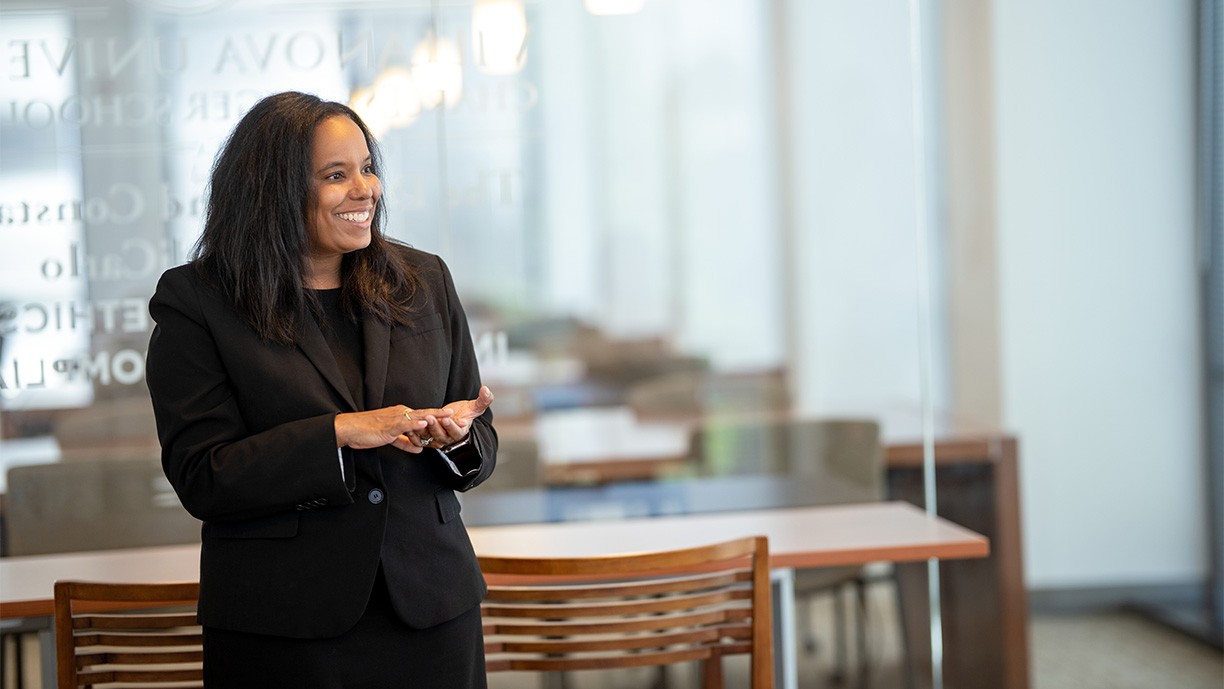Faculty Scholars: Teri Ravenell

"Lawyers have an enormous power for change," says Professor of Law Teri Ravenell, whose research focuses on qualified immunity, municipal liability, and federal civil rights litigation against police officials. These interests are rooted in her experience growing up in an upper-middle-class neighborhood in Charlottesville, VA, where she was often stopped by police for driving a "too-nice" car—and even followed by an officer into her own driveway after work one day.
"I was constantly racially profiled, so when I decided on law school, I knew I was going to study policing," she says. "I really wanted to change the system and not have other people experience what I did, or something far worse."
As the law school’s Associate Dean for Faculty Research and Development, Ravenell is passionate about helping her colleagues realize their own power for change through the research they publish. When she took on the position in 2019, she recalls asking herself, “If I had a wish list of things I could have had as a junior scholar, what would those be?” Although she and other faculty members have always published articles and book chapters and given presentations—after all, it’s a core part of the job—their work tended to happen in isolation, behind office doors. Working closely with Dean Mark Alexander, she set out to change that, building what she calls "a flourishing scholarly community."
"Many people think of writing as a solitary endeavor, but good scholarship doesn’t happen in isolation,” Ravenell says. “It is a result of getting feedback and encouragement from a lot of different folks. Some things that might have happened organically in the past—such as running into a colleague and then talking about an idea—we have tried to formalize."
So what does this look like at Villanova Law? It looks like weekly discussions throughout the summer where faculty members present works-in-progress and ask for feedback. It looks like writing retreats that provide structured time for faculty to write as well as discuss their work with colleagues—"partially for accountability, but also for encouragement and camaraderie," says Ravenell. And it looks like Faculty Fridays that provide a forum to discuss ideas, receive feedback on drafts, and get advice about topics ranging from writing op-eds to working with a research assistant.
Building a scholarly community also means connecting faculty with legal scholars beyond Villanova’s campus. Through the Faculty Connections Program, Villanova Law brings in high-profile scholars from other law schools for two days of formal presentations and informal networking. Ravenell also started a Faculty Exchange Program that allows faculty members to spend time at a dozen other law schools along the Northeast corridor and invites their professors to make a return visit to Villanova Law. It’s all about making connections and finding new opportunities to collaborate, which Ravenell views as an engine for research excellence.
"'Relational' is the one word I would use to describe successful scholarship," she says. "It’s about forging relationships with other scholars and the community as a whole."
As a result of these initiatives, an already-active faculty has become even more productive: publications are up by 20 percent versus the 2018-2021 time period. One priority for Ravenell is helping faculty members target top tier law reviews, as these publications tend to shape the national conversation about legal questions that are in the news. In Ravenell’s case, her two most recent articles were published in Top 25 law reviews, leading news outlets such as Time and MSNBC to consult her for expertise on qualified immunity and governmental accountability for constitutional violations.
"I have been given an opportunity to help my colleagues reach their potential, and I am making the most of it," she says. "At Villanova Law, we have such a deep bench of expertise in diverse topics: bankruptcy, procedure, corporate law, criminal law, healthcare, intellectual property. As legal scholars, we are often focused on a particular area of the law—but when we can get feedback from colleagues working in other areas, it enhances the depth and quality of our scholarship."
"We are creating a community of scholars where people feel supported and encouraged, and their work reflects this," Ravenell adds. "You benefit from being a part of something that is bigger than yourself."
"As I like to say, 'We all rise together.'"
Learn more about Professor Ravenell and her recent publications.
